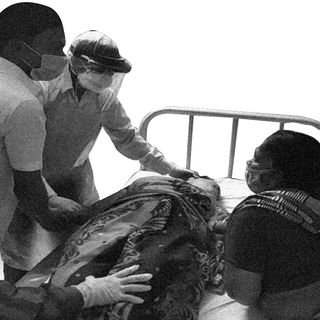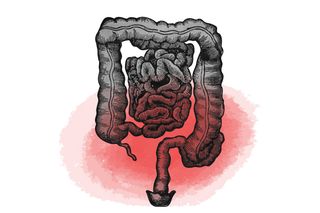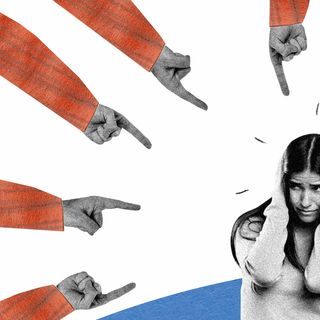
All You Need to Know About Irritable Bowel Syndrome
IBS is twice as common among women than men.

Irritable bowel syndrome (IBS) is a long-term gastrointestinal disorder that can cause persistent discomfort for years and significantly impair quality of life. Research suggests that people with IBS miss three times as many days from work as those without IBS.
“IBS imposes a substantial economic burden in direct medical costs and in indirect social costs such as absenteeism from work and school and lost productivity, along with the less-measurable costs of a decreased quality of life,” a 2004 study studying the socio-economic burdens of IBS concludes.
Researchers also note that people with IBS also often experience and depression, anxiety, chronic fatigue syndrome, somatoform disorders, and visceral hypersensitivity, or increased sensitivity to pain in the body’s internal organs.
What is IBS?
IBS is essentially a group of concurrent symptoms that include abdominal discomfort, bloating, and variations in bowel movement patterns (like diarrhea or constipation). It is a functional gastrointestinal disorder — that is, a disorder that occurs when an individual’s gastrointestinal tract behaves abnormally without any evidence of a disease.
Reportedly, IBS is twice as common in women than in men. And while it can develop at any age, most people seem to get it as teenagers or in early adulthood; it is less likely to be diagnosed in people above 50 years of age.
Related on The Swaddle:
Aching Muscles, Racing Heart, Diarrhea: How Anxiety Manifests in the Body
What are the types of IBS?
There are four different types of IBS:
- IBS with constipation, or IBS-C: This is characterized by hard or lumpy stools at least 25% of the time and loose or watery stools less than 25% of the time
- IBS with diarrhea, or IBS-D: This is characterized by loose or watery stools at least 25% of the time and hard or lumpy stools less than 25% of the time
- Mixed IBS, or IBS-M: This is characterized by hard or lumpy stools at least 25% of the time and loose or watery stools at least 25% of the time
- Unsubtyped IBS, or IBS-U: This is characterized by hard or lumpy stools less than 25% of the time and loose or watery stools less than 25% of the time
What are the symptoms of IBS?
IBS can cause a wide range of symptoms. In addition to the types of irregular bowel movements mentioned above, some of the most common symptoms are:
- cramps, usually in the lower half of the belly, which get worse after meals and better after bowel movements;
- bloating and gas;
- mucus in stool;
- feeling like one still needs to have a bowel movement even after they just did;
- intolerance to different kinds of food;
- fatigue;
- indigestion and heartburn; and
- feeling the urge to pee frequently.
Related on The Swaddle:
In a First, Scientists Map the ‘Good’ Viruses Living in the Human Digestive Tract
What causes IBS?
The causes of IBS remain uncertain, but experts hypothesize it could be a result of disturbed neural activity, such as poor coordination of signals along the brain-gut axis, a route of communication between nerve pathways that link the emotional and cognitive centers of the brain with intestinal function.
IBS can also develop after an individual experiences gastroenteritis, an infection caused by bacteria or viruses. Some researchers also believe that people with IBS have different gut microbes — helpful bacteria and fungi that live in our digestive tracts.
Experts also note that while psychological factors like depression or anxiety don’t cause or influence the onset of IBS, they may play a role in the persistence and severity of IBS symptoms. Interestingly, IBS has been found to occur commonly in people who experienced early life stress, though the precise influence of childhood stress is not understood.
IBS’ ‘flare-ups’ can be triggered by caffeine or alcohol, in addition to certain foods and beverages like wheat, dairy products, citrus fruits, beans, milk and carbonated drinks.
Further, for people with IBS, periods or menstrual pain can also trigger an onset of symptoms. Research also shows that patients with IBS often have a family history of IBS — suggesting that it is either due to shard genes, or shared environmental risk factors.
What is the treatment for IBS?
The diagnosis of IBS is based on the duration and frequency of symptoms and generally involves tests to eliminate other medical conditions that could be triggering the same conditions.
While there is no known cure for IBS, lifestyle and dietary changes, as well as medicines, can help some people handle their symptoms better. Doctors often suggest avoiding specific food that seems to trigger the patient’s IBS symptoms, as well as gluten, carbonated drinks, alcohol, or any other food items that can cause bloating and gas. In addition, patients are recommended a fiber-rich diet with plenty of water and adequate sleep to keep IBS-symptoms from ‘flaring up.’
Doctors may prescribe laxatives, anti-diarrheal medicines, pain medication, and different kinds of anti-depressants, depending on a patient’s symptoms and severity. Other drugs to address intestinal fluid secretion and alter bacterial growth in the gut, may also be prescribed. Sometimes, doctors may also prescribe probiotics to IBS patients.
Experts say that IBS is a life-long disorder, but it is possible for patients to go symptom-free for long periods of time until they experience a ‘flare-up.’
Devrupa Rakshit is an Associate Editor at The Swaddle. She is a lawyer by education, a poet by accident, a painter by shaukh, and autistic by birth. You can find her on Instagram @devruparakshit.
Related


Can Sex Robots Improve Quality of Life for Elderly, Disabled People Who Don’t Have Human Companionship?
